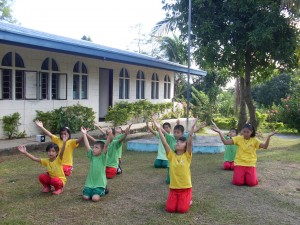Barrio del Fuego
Barangay San Francisco
General Trias, Cavite
Telefax: (046) 509 3009

Diyos ay narito...” is
a line from “Pasasalamat Ang Alaala ng Puso”, the Bukid Kabataan theme
song, whose music was composed by Sr. Mary Myra Atian and lyrics written by the
boys and girls of Bukid Kabataan themselves.
This
describes the kind of life that the less fortunate children are experiencing in
Bukid Kabataan.
Originally,
Bukid Kabataan was just a component of the Morning Glory Program (MGP) of
Caritas Manila, the social welfare and development ministry of the Archdiocese
of Manila. Then headed by Sr. Mary Lydia Kalaw, the MGP was created as a
response to the growing number of children lured to prostitution. The
increasing number of young street dwellers and the urgent need to put up a
shelter for them in a long-term program paved the way for the foundation of
Bukid Kabataan.
Sr.
Mary Myrna Tacardon, program manager of the Morning Glory Program from 1986 to
1991, started Bukid Kabataan in General Trias, Cavite for the recovery and
healing of street boys and for them to continue their education. It was a
timely move because at the time, another component of the Morning Glory
Program, the Marian Residence (a residential center for the recovery and
healing of street girls and prostituted women) was dissolved and its clients
were transferred to Bukid Kabataan. So was born the Tahanan ni Maria for the
young girls, and Bahay ni Jose for boys.
In
May 2000, with the restructuring of the Caritas Manila program set-up, the full
management of Bukid Kabataan programs and services was transferred to Bukid
Kabataan Center in Cavite, and the Morning Glory Program was dissolved.
Thus
was the first RGS Community in Bukid Kabataan Center established. Sr. Mary
Mercy Ang took over as the program manager and first Sister-in-Charge of the
BK-RGS Community.
Restructuring
and strengthening programs
The
initial years were a period of restructuring. New program services were
created, facilities were upgraded and the program policies were
institutionalized. The BK Primary School affiliated with the Department of
Education was evaluated for curriculum restructuring.
Sr. Maria Julieta Abrigo,
who became the program manager in 2002, continued the intensive restructuring
of the programs especially on development. This time, the center opted to
categorically concentrate on the sexually and physically abused children for a
more focused and effective delivery of services. The BK Primary School created
a special curriculum for the benefit of its clientele, 80 percent of whom are
cognitively challenged and behaviorally problematic.
2004
was an extraordinarily challenging year. Bukid Kabataan Center was given a
permanent license to operate and accreditation up to 2007 by the Department of
Social Welfare and Development after thorough evaluation of its programs and
services. Along with this, the Executive Board of Caritas Manila transferred
the administration of Bukid Kabataan Center to the Religious of the Good
Shepherd, which had been its partner since the beginning.
With
an open hand and willing spirit and with the specific orientation of serving
the marginalized and the oppressed, the Congregation accepted the task of
administering the center. And, with the support of local and foreign donors,
the doors of Bukid Kabataan will remain open for the wounded children of
society.
In 2009,
the Department of Agriculture granted Bukid Kabataan 17 greenhouses through the
endorsement of Bishop Luis Antonio Tagle of the Diocese of Imus. On May 31,
2010 the greenhouses were blessed and turned over to the management of Bukid
Kabataan Center.
This
project aims to provide a sustainable income for Bukid Kabataan, supporting its
vision to be self-reliant, using organic and chemical-free farming. Bukid
Kabataan Center’s beneficiaries in the nearby poor community were given
intensive skills training on organic farming and greenhouse management. This
also intends to provide alternative jobs for these poor families to alleviate
poverty.
In 2010,
Sr. Ma. Gemma Dinglasan, in partnership with the Department of Education,
formulated the new school curriculum for Special Education to be applied to the
Caritas Bukid Kabataan Elementary School, incorporating expressive and
occupational therapies to all subjects in school. This development saw full
implementation in school year 2011.
With the increasing number of
sexually and physically abused children, Bukid Kabataan Center will continue to
find ways and means to improve its services to better serve the least, the lost
and the last.
(From the Centennial Coffee table Book:
Religious of the Good Shepherd: 100 Years in the Philippines)
|
ALL TOGETHER NOW: BK residents on their way to |
(Excerpt from an article by Ma. Ceres P. Doyo for the Sunday Inquirer on December 3, 2011.) |
|
Bukid The BK In Located BK In “Pasasalamat Their
|
